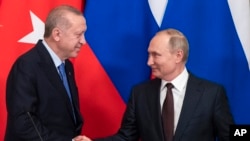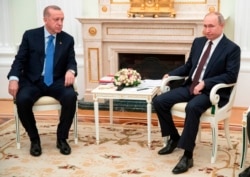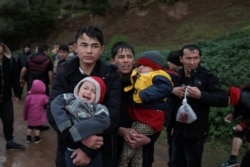Russia and Turkey agreed to a cease-fire deal in Syria’s troubled Idlib province following marathon talks in Moscow aimed at preventing the two countries’ often dueling political aims in Syria from spiraling into a direct military conflict.
Russian President Vladimir Putin and his Turkish counterpart, Recep Tayyip Erdogan, met for six hours of negotiations at the Kremlin — more than three of them alone with their translators — in an effort to find a way out of the Idlib impasse.
The area in the northwest of Syria has been the site of intense fighting between Turkish and Syrian government forces in recent weeks — with Syrian leader Bashar al-Assad, backed by Russian air power, vowing to retake the territory from a dwindling band of rebel separatists supported by Ankara.
Compromise reached
The escalating tensions put at risk the delicate web of military alliances the Kremlin has developed over its five-year military campaign in Syria — where Russia has come to the rescue of Turkey’s nemesis Assad while simultaneously partnering with Ankara to fight a common enemy in the Islamic State.
“We do not always agree with our Turkish partners in our assessments of what is happening in Syria, but each time at critical moments, relying on the achieved high level of bilateral relations, we have thus far managed to find common ground on the disputed issues that have arisen, and come to acceptable solutions,” said Putin following the talks. “And that was the case here.”
Indeed, the two sides managed to come up with what essentially amounted to a compromise that reduced tensions while addressing none of the core issues that prompted the crisis to begin with.
In essence, Russia agreed to enforce a previously negotiated de-escalation zone in Idlib that Turkey wants to protect its own border, while Turkey agreed to halt counterattacks on Syria and again acknowledge the Idlib region ultimately belongs to Damascus.
Humanitarian aid, joint patrols
The deal’s key provision, announced in detail by both countries’ foreign ministers, allowed for a cease-fire to go into effect at midnight Thursday.
The two sides also announced a humanitarian corridor would open to allow an estimated 1 million refugees who had amassed at the Syrian-Turkish border to return home to Idlib.
It was a key Turkish demand. Russia had been suggesting that the humanitarian crisis from the fighting in Idlib was overblown.
“We will work together to supply aid for the Syrians in need,” said Erdogan, in announcing the measure.
Russia and Turkey also announced plans to conduct joint patrols over portions of Idlib within seven days — the presence of Russian troops apparently intended to prevent Syrian regime forces from firing on Turkish soldiers in the area.
Indeed, there were immediate reasons to question whether Assad would respect the cease-fire deal.
In an interview with the Kremlin-backed Rossiya 24 channel that aired just minutes after the summit ended, the Syrian leader once again vowed the fall of Idlib to his Syrian government forces was just a matter of time.
For his part, Erdogan insisted Turkey reserved the right to respond to any future Syrian aggression, despite the cease-fire.
Who invited whom?
Before the real talks began, there were hints at gamesmanship over who initiated the summit, with a grim looking Putin noting that he was happy to meet with the Turkish president “at your request.”
In turn, Erdogan countered that he’d agreed to Putin’s offer to hold talks in Moscow instead of Istanbul simply because the Russian leader was consumed with proposed changes to Russia’s constitution.
Certainly, Erdogan was aware that the proposed amendments are widely viewed as a questionably legal effort by Putin to keep sway over Russian political life beyond the end of his fourth and final term in 2024.
Either way, the leaders mostly struck conciliatory tones before cameras.
Putin express condolences for the deaths of more than 30 Turkish soldiers in a Syrian-led airstrike last week, saying that Moscow had been unaware the troops were in the area. Ignoring that Ankara has contested that account, the Russian leader added that Syrian forces, too, had suffered heavy losses.
Erdogan, in turn, noted that despite the Idlib tensions, Russian-Turkish relations were at their “peak.”
Moscow-Ankara ties
Indeed, for all the rancor over Idlib, Moscow and Ankara have recently struck important deals in nuclear energy, gas and arms — a growing relationship that has irked Turkey’s NATO allies and the U.S. in particular.
Yet, some analysts suggested, Turkey’s membership in the military alliance played a key role in Moscow’s decision to cut a deal with Ankara, rather than push for outright victory by its allies in the Syrian regime.
“It’s obvious that the Russian operation in Syria since 2015 was focused on fighting with the Syrian opposition and terrorists, but not with other governments, not to mention a member of NATO,” wrote foreign policy analyst Vladimir Frolov in the online independent magazine Republic.
“The Kremlin didn’t sign up for that.”






